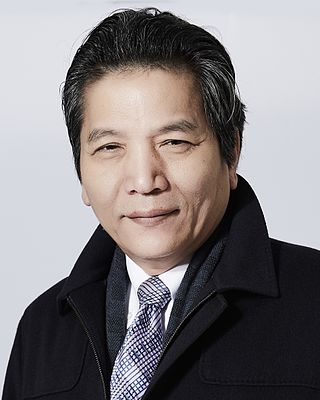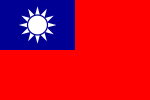
Taiwan, officially the Republic of China (ROC), is governed in a framework of a representative democratic republic under a five-power system first envisioned by Sun Yat-sen in 1906, whereby under the constitutional amendments, the President is head of state and the Premier is head of government, and of a multi-party system. Executive power is exercised by the Executive Yuan. Legislative power is vested primarily in the Legislative Yuan. Taiwan's judiciary is independent of the executive and the legislature. In addition, the Examination Yuan is in charge of validating the qualification of civil servants, and the Control Yuan inspects, reviews, and audits the policies and operations of the government.

The president of the Republic of China, also known as the president of Taiwan, is the head of state of the Republic of China, commonly known as Taiwan, as well as the commander-in-chief of the Republic of China Armed Forces. Before 1949 the position had the authority of ruling over Mainland China, but after communist victory in the Chinese Civil War, the remaining jurisdictions of the ROC have been limited to Taiwan, Penghu, Kinmen, Matsu, and smaller islands.

The Legislative Yuan is the unicameral legislature of the Republic of China (Taiwan) located in Taipei. The Legislative Yuan is composed of 113 members, who are directly elected for four-year terms by people of the Taiwan Area through a parallel voting system.

Song Jiaoren was a Chinese republican revolutionary, political leader and a founder of the Kuomintang (KMT). Song Jiaoren led the KMT to electoral victories in China's first democratic election. He based his appeal on the upper class gentry, landowners, and merchants. Historians have concluded that provisional president, Yuan Shikai, was responsible for his assassination on 22 March 1913.

The National Assembly was the authoritative legislative body of the Republic of China, from 1947 to 2005. Along with the Control Yuan and the Legislative Yuan, the National Assembly formed the tricameral parliament of the Republic of China.

The Constitution of the Republic of China is the fifth and current constitution of the Republic of China (ROC), ratified by the Kuomintang during the Constituent National Assembly session on 25 December 1946, in Nanking, and adopted on 25 December 1947. The constitution, along with its Additional Articles, remains effective in ROC-controlled territories.

The Premier of the Republic of China, officially the President of the Executive Yuan, is the head of government of Taiwan and leader of the Executive Yuan. The premier is nominally the principal advisor to the president and positioned as the head of central government, appointed by the president without approval by the Legislative Yuan. The current president of the Executive Yuan is Cho Jung-tai, who took office on 20 May 2024.

The Control Yuan is the supervisory and auditory branch of the government of the Republic of China, both during its time in mainland China and Taiwan.
The Examination Yuan is the civil service commission branch, in charge of validating the qualification of civil servants, of the government of the Republic of China (Taiwan). It has a president, a vice president, and seven to nine members, all of whom are nominated by the president of the republic and confirmed by the Legislative Yuan for four-year terms according to Republic of China laws.

The president of the Legislative Yuan is the presiding officer of the Legislative Yuan of the Republic of China. The incumbent president is Han Kuo-yu, a legislator from the Kuomintang.

The Government of the Republic of China, is the national authority whose actual-controlled territory consists of main island of Taiwan (Formosa), Penghu, Kinmen, Matsu, and other island groups, collectively known as Taiwan Area or Free Area. A unitary state, the ROC government, under the current constitutional amendments, is run by a de facto semi-presidential system, consists of the presidency and five branches (Yuan): the Executive Yuan, Legislative Yuan, Judicial Yuan, Examination Yuan, and Control Yuan. The president is the head of state, with the premier as the head of government, currently ruled by the Democratic Progressive Party (DPP) since 2016. Since the 2005 amendments of the Additional Articles of the Constitution, the Legislative Yuan has been the de facto unicameral parliamentary body of the country.
The law of the Republic of China as applied in Taiwan, Penghu, Kinmen, and Matsu is based on civil law with its origins in the modern Japanese and German legal systems. The main body of laws are codified into the Six Codes:

Wu Jin-lin is a Taiwanese politician. He served as the President of the Examination Yuan from 2014 to 2020. He also briefly served as President of the Examination Yuan in 2008.

Chia Ching-teh was a politician in the Republic of China. He was the Vice Premier in 1949.
Events from the year 1966 in Taiwan, Republic of China. This year is numbered Minguo 55 according to the official Republic of China calendar.

Lee Hung-chun is a Taiwanese politician who serves as the vice president of the Control Yuan since 1 August 2022. Before his vice-presidentship, he serves as the member of Legislative Yuan for eighteen years from 2002 to 2020.









































